“Talk Less”
It’s a simple suggestion, but it can be a powerful parenting tool.
The number one bonus of talking less is that you also shout less, which is great if you are trying to stop yelling at your kids. And simply being aware of how much you talk and thinking about if it is really necessary will bring all kinds of other benefits too.
Find out why parents should talk less and listen more, and how it will make you a better parent, and download our bonus free printable ‘talk less’ poster to stick on the fridge and remind you of this parenting tool.
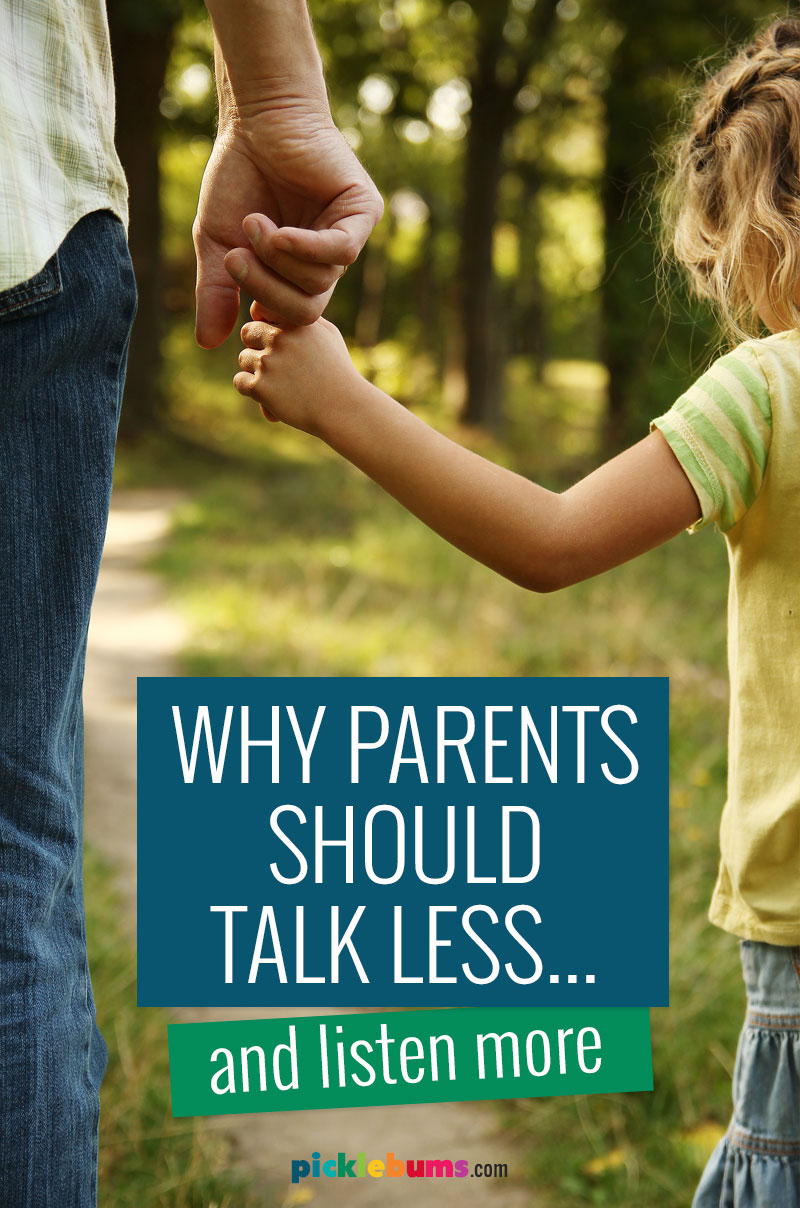
Talk Less.
It seems like such a simple thing, can it really be a powerful parenting tool?
I read it on one of my favourite parenting sites, Parenting Passageway, many years ago and I’ve been pondering the idea ever since.
I talk quite a bit.
I spend a good deal of my day talking to (at?) my kids, trying to get them to listen and understand. I try to explain things, in the home that they will follow my instructions, and confirm to my ideas without too much struggle or unhappiness.
Often I feel like I am talking to thin air. And then talking becomes whining, and whining becomes shouting and suddenly I am not the kind of parent I want to be.
Seven Reasons Why Parents Should Talk Less (and Listen More).
Of course we are not suggesting that you should stop talking to your kids all together!
Kids need to hear language modelled to learn and talking to your kids (even when they are too young to talk to you)_ is important for all areas for their development. But, you might be like me, and realise that you do an awful lot of talking, and when you stop and think about it, you could probably say a lot less!
So challenging yourself to ‘talk less’ is a simple concept that can have really great results.
When you talk less you are forced to lean into the physical-ness of parenting.
When you talk less, you do more. You learn to use rhythm and routines, gentle touches and physical actions to guide children through the day. This can work wonders for children who seem like they ‘never listen’ and can be very calming for children who struggle with sensory overload.
When you talk less you shout less.
When you talk less you whine less, and you shout less. If you are working on how to stop yelling at your kids, challenging yourself to talk less is a great way to break that cycle. If you wait before you speak it also gives you an extra moment to take a breath and think about how to respond, and often that is all you need to not yell.
When you talk less you are more aware of what you are saying and how you are saying it.
Being mindful of how much you are speaking also means you are more aware of the things you do say, and the way you say them. The way you speak to your children is the way they learn to speak to people, so being aware of how you say things can be very useful. And choosing your words more carefully can help you make your message clearer, and to use more positive language with your kids so they are more likely to have the impact you’d like.
When you talk less you listen more.
Listening, really listening to your kids will make a huge difference in your parenting. Not only will it help you to know your child better and connect better, it helps you teach respectful communication (you can’t expect your kids to listen to you if you don’t listen to them) and it will help you resolved conflicts as you’ve taken the time to get information and allowed your child to feel heard and respected.
When you talk less you give your child more time to process what you are saying.
Talking less doesn’t have to mean saying nothing at all. It could mean using shorter, more simple sentences, it could mean only saying one or two sentences at a time, or it could mean allowing more time between speaking. All these tactics are really helpful for younger kids, and kids who may take longer to process and understand your words, and then figure out a response. All kids will be better able to take in what you are saying if you say less and give them more time to process.
When you talk less you see more.
When you are consciously trying to talk less you suddenly have time to see more. You can see the expression on your child’s face, can see that the ‘mess’ is actually creative play. Talking less almost gives you the power to see into the future… ok not really, but it does give you a moment of extra time to think and that is almost as good. If your brain is not immediately trying to think of words to spit out of your mouth, it has the space to observe and you’ll be surprised at how much more you will know just from having a moment to look.
When you talk less you allow silence.
Of course talking less means it is less noisy, but have you ever stopped to think about how that might affect you as a parent and your kids? Constant background noise can be very overwhelming and overstimulating for both parents and kids. Sometimes we can all find ourselves just craving a bit of silence. Most kids are not so great at the quiet thing, but by talking less you can at least not contribute to the noise, and you are modelling that silence doesn’t always need to be filled.
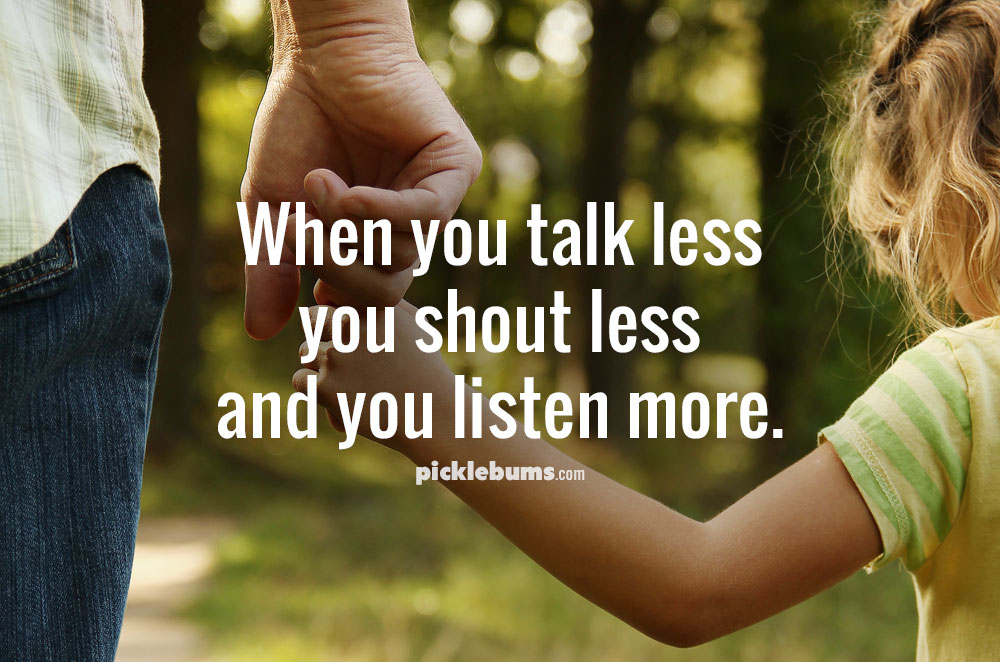
How Talking Less Worked for Me.
When I really thought about how much I spoke, I realised a lot of the time I could actually say nothing at all. So I began consciously reminding myself to simply say less and listen more.
I printed the poster I made (see below to print your own copy) and stuck it on the fridge, and every time I walked past I was reminded to talk less.
What I found was that I immediately heard more. I heard the way my kids were talking to each other, and the way they were playing and I learned so much. I learned about how they were getting along as siblings, and where they were at developmentally, and what sort of things they liked doing. All this was such useful information, and also just made me happier!
I also found that I whined less, I yelled less, and I took more time to think about how my choices and behaviours affected my family. And I was often more physically affectionate. Instead of saying something to an upset child I just opened my arms for a hug, which magically was often all they needed!
And probably the most important thing of all, when I talked less I was more mindful about what I was saying and how I said it, and it my kids all seemed to be able to take in my words better. Plus the actual reduction in noise was bliss! When I chose to be quieter, my kids often did too.
Talking less is not a magic trick that will immediately make all parenting easy (I wish) and it’s not something that comes naturally to some of us, or something you would choose to do all the time, but setting yourself a challenge to ‘talk less’ can really help you be more mindful of what you say, to listen better, and to focus on your kids more, and that’s always a good thing.
Talk Less Printable Poster
If you would like to challenge yourself to ‘talk less’ but need a little reminder like I do, then you can download this A4 sized printable poster and pop it on your fridge, or wherever you’ll see it!
You can download the free printable ‘Talk Less’ Poster here.
This printable is an A4 sized pdf file, you will need a pdf reader such as adobe acrobat to open it. If you are printing on US ‘letter sized’ paper be sure to select ‘fit’ or ‘shrink to fit’ from your printer options.
Please remember that the printables at picklebums.com are for personal use only, you may not sell, share, or link directly to these files.
If you are looking for some more gentle parenting ideas and inspiration you might all like these articles:

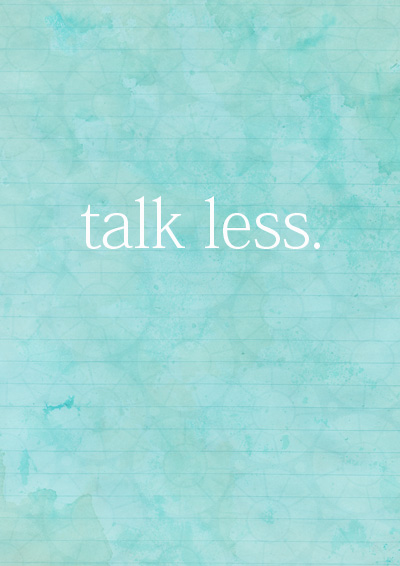
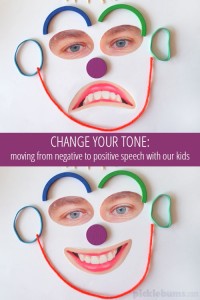
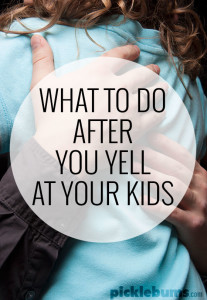
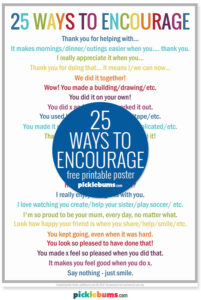
So hard to do isn’t it. I’ve been encourage by various therapists to talk less with my girls and when I do talk to simplify what I say. It is a real challenge.
Kate,
Can you please shrink yourself and sit on my shoulder, whispering in my ear, this wonderful statement of yours all day?
I need to Talk Less. A Whole Lot Less.
Timely post (for me at least).
xo
Oh wow do I need to do this. As a therapist, sometimes I forget that I don’t need to come home and ‘counsel’ my entire family all day. Talk Less. My new motto – thanks :)
but its very difficult to talk less…
oh yeah – so sick of the sound of my voice and the sound of everyone elses as well -send me to a silent order PLEASE!
xx
A thoughtful post, thank you. And I love Parenting Passageway as well. She is a sage.
So wise – but so hard to do!
I struggle to say what I want to say to the toddler in a concise way that she will understand and so I fear I end up rambling on and I doubt she actually understands any of it.
Pinned you!
I get sick of my own voice, sick of knowing that neither Miss 4 or husband listen. Yesterday I was so down because even the family beyond this house don’t listen. Maybe I don’t choose the right words. Maybe I should talk less, and give myself the time to find the right words.
Great advice. I long ago gave up long winded explanations, for the reasons that you mention but also because kids don’t need them. Now for example, if I have to say no, it is “no” followed by one short line of reasoning, and then nothing else , end of story. When I stop responding they now know the argument is over. For a long time there we tried to parent as if children were entitled and capable of processing laborious explanations…..hopefully now we are beginning to see that sometimes all a child needs to hear is simply “no”.
I definitely need to talk less!! No-one listens anyway. My talking has been getting louder and louder too and I’ve noticed the louder I have to talk the louder they do and before I know it we are all shouting at each other. It’s awful! It is becoming a real habit so thanks for reminding me!
Along the same lines, as my son grows, I have worked to arrange my house so that there is less forbiden stuff for him to get into. I would rather get rid of “treasures” than spend my whole life telling him “no. no. no. no…” When I say no, I want it to be something important.
I needed to read this. Thank you.
yes I also needed to read this and I feel the same as Bron66. thanks for sharing!
I’m working on this too! My sweet little boy is such a chatter box and I’ve always wondered why. And then I realized every time there’s a quiet moment I tend to engage him in conversation. SO who’s the chatter box? lol
Do I ever need to learn this! Like you I escalate from talking to reasoning to exasperation and finally shouting. And its happening too often. I am going to stick this on my fridge.
This is a great reminder. we worked hard on talking less, talking more clearly, with eye contact and at childs-eye level when my eldest son was doing masses of early intervention. It’s a good tactic for raising my children’s understanding of non-verbal cues as well as eye contact/visual referencing. Also used to whisper a lot, must get back into that.
YES! This is so important for my patience, but also for kid’s comprehension. Children (especially those with a history of middle ear infections) need all the help they can get to understand instructions. Stripping away all of the extraneous factors, such as background noise (turning off the TV), visual distractions (encouraging eye contact) and information overload (too much talking) has such a positive effect on their ability to concentrate and comply with requests. Talk less = better instructions = higher likelihood that they’ll do what you ask = happy mummy! Thankyou for introducing me to parenting passageway – I’ll be reading more of their suggestions!
Love this! You just hit at the core of my frustration recently. I just stumbled on this but am very happy I did. Talk less. I get it… thank you :-)